
[ad_1]
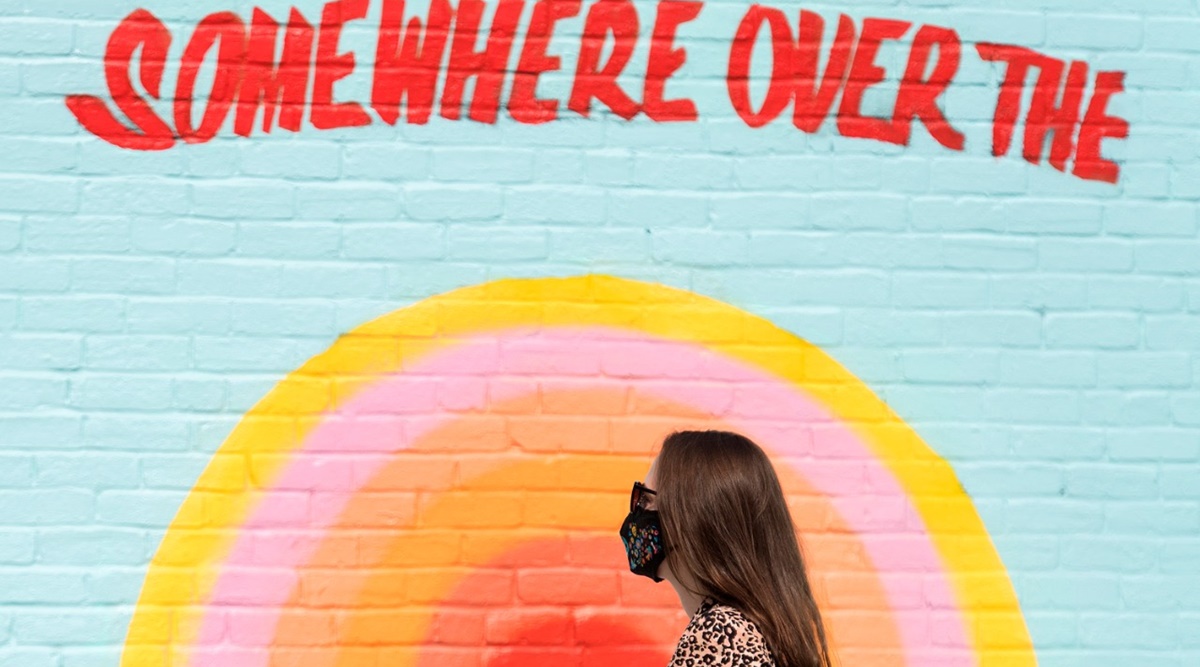 A woman wears a face mask as she walks by a mural on a street in Montreal, Monday, September 7, 2020, as the COVID-19 pandemic continues in Canada and around the world. THE CANADIAN PRESS/Graham Hughes
A woman wears a face mask as she walks by a mural on a street in Montreal, Monday, September 7, 2020, as the COVID-19 pandemic continues in Canada and around the world. THE CANADIAN PRESS/Graham Hughes
Coronavirus Global Updates: The US Government Wednesday outlined a sweeping plan to make Covid-19 vaccine available for free to all Americans whenever it is proven safe and effective, though a top public health official made it clear that widespread vaccination wouldn’t begin until well into the next year.
President Donald Trump asserted Tuesday that a vaccine could be three to four weeks away, but the head of the Centers for Disease Control and Prevention told Congress Wednesday that it would take six to nine months after any shots approval to distribute it nationally.
Globally, the cases zoomed past 29.7 million, with more than 6.6 million cases in the US and over 5 million cases in India. The global death toll stands at 939,456.
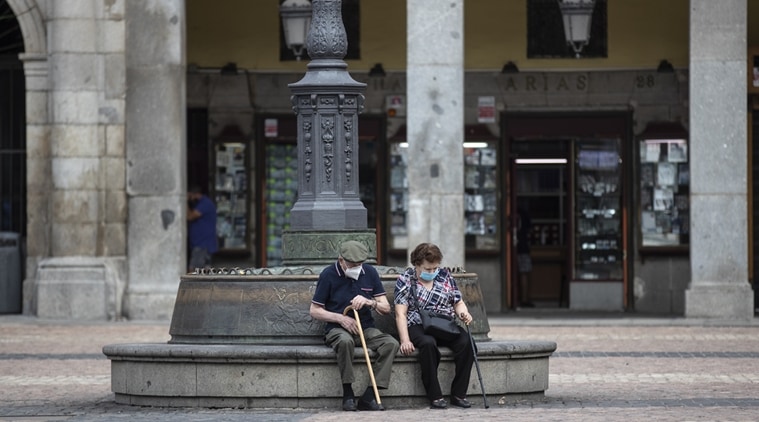 A couple wearing face masks to prevent the spread of coronavirus sit, in downtown Madrid, Spain, Wednesday, Sept. 16, 2020. (AP)
A couple wearing face masks to prevent the spread of coronavirus sit, in downtown Madrid, Spain, Wednesday, Sept. 16, 2020. (AP)
Here are the top developments globally:
COVID-19 danger continues to drive joblessness in US
The number of Americans applying for unemployment benefits fell last week to 860,000, a historically high number of people that illustrates the broad economic damage still taking place nine months after the first case of COVID-19 was detected in the U.S.
The Labor Department said Thursday that U.S. jobless claims fell by 33,000 from the previous week and that 12.6 million are collecting traditional unemployment benefits, compared with just 1.7 million a year ago.
The pandemic has delivered a colossal shock to the economy. Until the pandemic upended the operations of American companies, from factories to family diners, weekly jobless aid applications had never exceeded 700,000 in the U.S. They’ve topped 700,000 for 26 consecutive weeks.
The overall economy, as measured by the gross domestic product, collapsed at an annual rate of 31.7% from April through June, by far the worst three months on record, as millions of jobs disappeared.
The economy and job market have recovered somewhat from the initial shock. Employers added 10.6 million jobs from May through August, but that’s still less than half the jobs lost in March and April.
Nepal’s coronavirus tally nears 60,000
Nepal’s number of coronavirus cases neared 60,000 on Thursday after 1,246 new infections were detected in a single day, the health ministry said. Jageshwar Gautam, spokesperson for the Ministry of Health and Population, said that 1,246 new COVID-19 cases were reported while conducting 10,641 tests across the country in the past 24 hours.
With this, the total number of people infected with COVID-19 has reached 59,573, he said. The number of coronavirus patients currently undergoing treatment is 16,241. Four people have died of COVID-19 in the country, taking the total number of fatalities to 383.
North-east England in tougher lockdown as COVID-19 cases rise
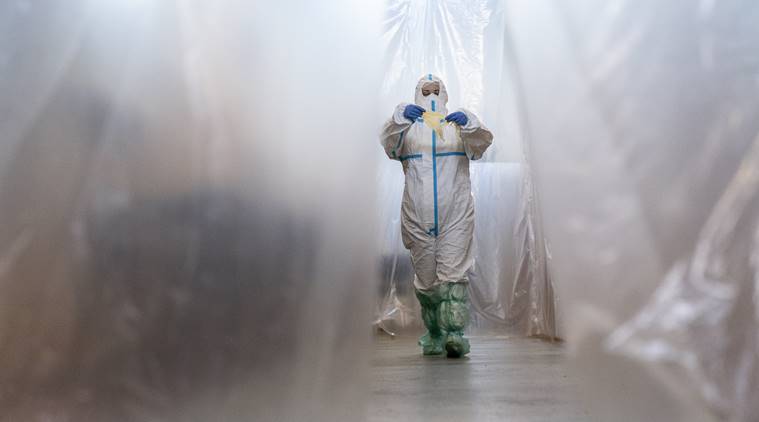 The tougher lockdown measures for the region will involve a ban on public gatherings and mingling between different households. (AP Photo/Evgeniy Maloletka)
The tougher lockdown measures for the region will involve a ban on public gatherings and mingling between different households. (AP Photo/Evgeniy Maloletka)
Nearly 2 million people in the north east England regions of Northumberland, Newcastle, Sunderland, North and South Tyneside, Gateshead and County Durham are being put under stricter movement restrictions amid a spike in COVID-19 cases.
UK Health Secretary Matt Hancock told the House of Commons that the decision, taken in consultation with local leaders, came as Sunderland showed a coronavirus infection rate of 103 cases per 100,000 people, while in South Tyneside Gateshead and Newcastle the figures are all above 70.
The tougher lockdown measures for the region will involve a ban on public gatherings and mingling between different households. “After seeing cases in the north east rise to a concerning level, local authorities requested support for tighter restrictions and we have taken swift action to accept their recommendations,” the minister said.
WHO calls for consistent message on virus
The emergencies chief of the World Health Organization says scientific disagreements over COVID-19 interventions like masks and vaccines shouldn’t be treated as some kind of political football, but acknowledged that it isn’t easy for everyone to be on message all the time.
Asked to respond to the open disagreements between U.S. President Donald Trump and the director of the U.S. Centers for Disease Control and Prevention over the effectiveness of masks and when a coronavirus vaccine might be available, Dr. Michael Ryan said it is important that we have consistent messaging from all levels.”
Nations need to come together to provide vital treatment to suppress COVID-19 transmission: UN chief
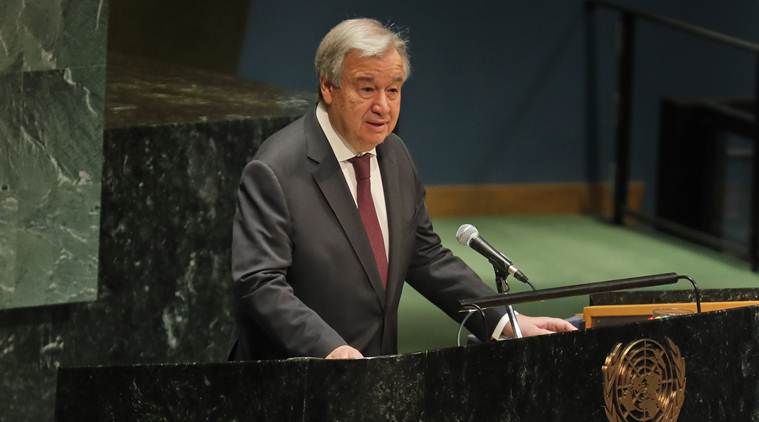 Guterres voiced concern that the outbreak is out of control and the world will soon pass “the grimmest of milestones with one million lives lost to the virus. (File)
Guterres voiced concern that the outbreak is out of control and the world will soon pass “the grimmest of milestones with one million lives lost to the virus. (File)
Describing the coronavirus as the number one “global security threat” facing the world today, UN Secretary General Antonio Guterres has said that nations need to come together to provide vital treatment to suppress transmission and save lives over the next year.
“This is also the moment when the international community needs to come together to defeat the virus. Many pin their hopes on a vaccine – but let’s be clear: there is no panacea in a pandemic. A vaccine alone cannot solve this crisis; certainly not in the near term,” Guterres said at a press conference on Wednesday. He said nations need to massively expand new and existing tools that can respond to new cases and provide vital treatment to suppress transmission and save lives, especially over the next 12 months.
Guterres voiced concern that the outbreak is out of control and the world will soon pass “the grimmest of milestones with one million lives lost to the virus. “The COVID-19 pandemic is a crisis unlike any in our lifetimes, and so this year’s General Assembly session will be unlike any other, too,” he said. “In this 75th anniversary year, we face our own 1945 moment. We must meet that moment, he said, calling for solidarity and unity like never before to overcome today’s emergency, get the world moving and working and prospering again.
Immune system’s T cells play bigger role in reducing COVID-19 severity: Study
Vaccine candidates for COVID-19 should elicit a broad immune response that includes antibodies, and the body’s helper and killer T cells, according to a study which says weak or uncoordinated immunity may lead to a poor disease outcome.
The research, published in the journal Cell, confirms that a multi-layered, virus-specific immune response is important for controlling the novel coronavirus during the acute phase of the infection and reducing COVID-19 disease severity. “Our observations could also explain why older COVID-19 patients are much more vulnerable to the disease,” said study senior author Shane Crotty from the La Jolla Institute for Immunology in the US.
“With increasing age, the reservoir of T cells that can be activated against a specific virus declines and the body’s immune response becomes less coordinated, which looks to be one factor making older people drastically more susceptible to severe or fatal COVID-19,” Crotty said.
Turkey begins Phase 3 trials for China’s Sinovac Biotech vaccine
Turkey’s Health Minister Fahrettin Koca said Phase 3 trials for Chinas Sinovac Biotechs two-step vaccine have begun in the country, with three Turkish health workers taking the shot. Koca said Wednesday the trial would expand to 1,200 volunteers and then to 10,000.
He said trials for a Pfizer vaccine were also beginning and others were pending, adding that he hoped widespread vaccinations would start towards the end of 2020.
Hawaii to allow travelers to skip quarantine with virus test
Hawaii Gov David Ige said Wednesday that starting October 15, travellers arriving from out of state may bypass a 14-day quarantine requirement if they test negative for COVID-19. Travellers will have to take the test within 72 hours before their flight arrives in the islands.
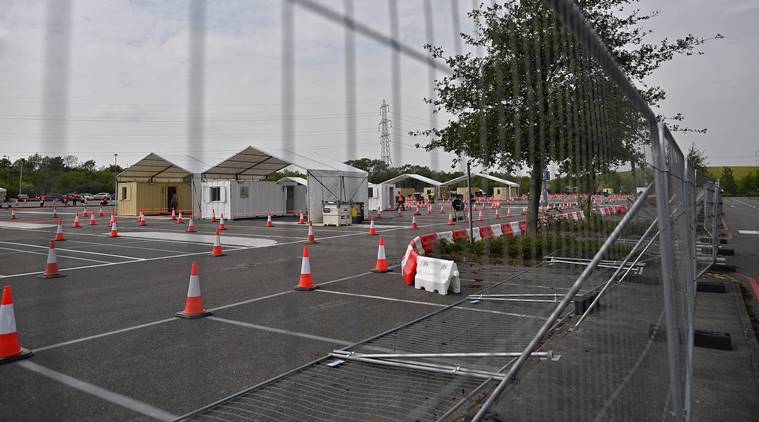 A coronavirus COVID-19 testing centre is pictured in a car park at Ebbsfleet International Railway Station, in Ebbsfleet, south east of London, on April 27, 2020. Photographer: Ben Stansall/AFP/Getty Images
A coronavirus COVID-19 testing centre is pictured in a car park at Ebbsfleet International Railway Station, in Ebbsfleet, south east of London, on April 27, 2020. Photographer: Ben Stansall/AFP/Getty Images
Ige said drug store operator CVS and healthcare provider Kaiser Permanente will conduct the tests as part of an agreement with the state. Earlier this year, Ige planned to start a pre-travel testing program on Aug. 1 only to have to postpone it as COVID-19 cases spiked on the US mainland and in Hawaii.
A shortage of testing supplies also forced delays. Another start date for September 1 was also cancelled. Airlines are expected to help inform travellers of the requirement.
South Africa set for easing of virus restrictions
South Africa will open its borders from next month for international travel as the country moves to the lowest level of its five-step coronavirus lockdown from midnight of September 20. President Cyril Ramaphosa on Wednesday announced a slew of reductions in restrictions — an attempt to revive the economy that has been severely hit by the six-month lockdown.
“Our economy and our society have suffered great devastation. We have endured a fierce and destructive storm. But, by standing together, by remaining resolute, we have withstood it,” Ramaphosa said. “Two months ago, at the height of the storm, we were recording around 12,000 new cases a day. Now, we are on average recording less than 2,000 cases a day. We now have a recovery rate of 89 per cent,” the president said.
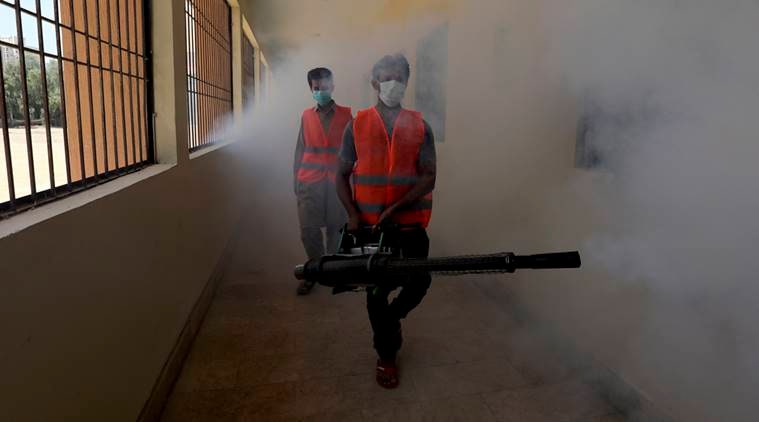 A worker disinfects a corridor of a school building in preparation for reopening schools that were closed in March, in Karachi, Pakistan, Thursday, Sept. 10, 2020. Education officials in Pakistan say authorities will start reopening schools from Sept. 15 amid a steady decline in coronavirus deaths and infections. (AP Photo/Fareed Khan)
A worker disinfects a corridor of a school building in preparation for reopening schools that were closed in March, in Karachi, Pakistan, Thursday, Sept. 10, 2020. Education officials in Pakistan say authorities will start reopening schools from Sept. 15 amid a steady decline in coronavirus deaths and infections. (AP Photo/Fareed Khan)
However, he urged the citizens to continue to wear masks and maintain social-distancing to ensure the country did not move to a new wave of infections.
Reports from Syria point to much broader spread: UN humanitarian chief
The UN humanitarian chief says reports from inside Syria point to a much broader spread of COVID19 cases than the 3,628 confirmed cases convey. Mark Lowcock told the UN Security Council on Wednesday that the extent of the outbreak won’t be known until laboratory testing is increased across the country.
He said, “We do know that community transmission is widespread as almost 90 per cent of newly confirmed cases cannot be traced to a known source.” “Infection rates among health workers have also been rising,” he added.
New companies face tough task overcoming pandemic recession
A recession amid a pandemic may seem like the worst time to start a business. Despite millions of loans and grants from federal and state governments, it’s estimated that hundreds of thousands of companies have already failed since the virus outbreak began.
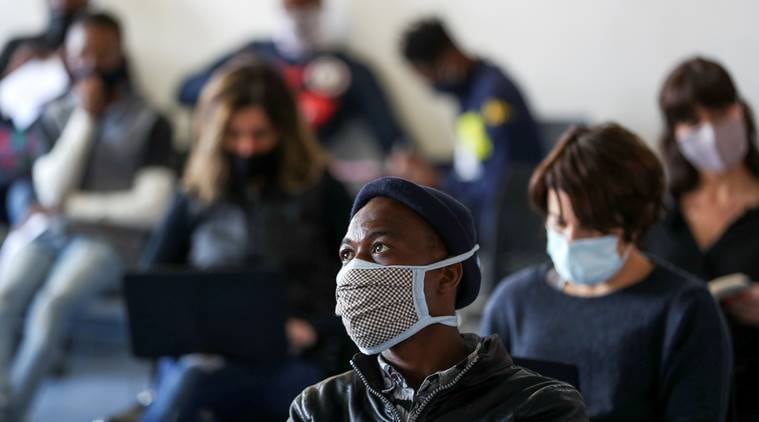 FILE PHOTO: Vaccine trials’ volunteers wait for their names to be called before testing for the coronavirus disease (COVID-19), and taking part of the country’s human clinical trial for potential vaccines at the Wits RHI Shandukani Research Centre in Johannesburg, South Africa, August 27, 2020. REUTERS/Siphiwe Sibeko/File Photo
FILE PHOTO: Vaccine trials’ volunteers wait for their names to be called before testing for the coronavirus disease (COVID-19), and taking part of the country’s human clinical trial for potential vaccines at the Wits RHI Shandukani Research Centre in Johannesburg, South Africa, August 27, 2020. REUTERS/Siphiwe Sibeko/File Photo
Owners of all these fledgling companies face a tough road as they try to bring in customers and thrive. While nearly 80 per cent of startup companies had survived their first year in 2019, according to research by the Kauffman Foundation, those businesses had the benefit of launching in a strong economy.
Germany declares three European capitals at risk
Germany has declared three European capitals and several regions risk areas for coronavirus. The Foreign Ministry said on Wednesday that the Austrian capital Vienna Budapest in Hungary and the Dutch region that includes Amsterdam were added to the risk list due to high numbers of COVID-19 infections there.
Also listed were several regions in France, Romania, Croatia, Switzerland, and the Czech Republic. Travelers arriving in Germany from those locations have to go into mandatory quarantine and take a coronavirus test.
📣 The Indian Express is now on Telegram. Click here to join our channel (@indianexpress) and stay updated with the latest headlines
For all the latest World News, download Indian Express App.
© IE Online Media Services Pvt Ltd
[ad_2]
Source link